Following on from Part 1: Hierarchy, National Interest, Bias
So, where did the story start?
Wang Chuqin’s journey hasn’t followed the typical “find a mentor, rise to the top” storyline. Instead, he’s had to navigate a complicated maze of favoritism, random coach swaps, and limited resources. In a system where standing still means falling behind, most core CNT players have long benefited from dedicated supervising coaches, but Wang didn’t. He spent key years bouncing from one coach to another. Or sometimes, left completely on his own.
1. Wang Chuqin’s Career Path with Coaches
2017-2018: Coach Wu Jingping,
The First (and Short-Lived) Stability
Back in 2014, Wang Chuqin earned his spot on CNT’s Second Team after winning both the U15 and U18 singles titles at the China National Junior & Youth Table Tennis Championships. By late 2015, he had clawed his way into Team One through internal selection matches.
But for nearly two years afterward, he trained without a dedicated coach, just another young player trying not to drown in the CNT machine. Back then, the 2016 Rio Olympics was the top priority, with all resources focused there. Then came a wave of internal politics within CNT, which threw training routines and team dynamics into chaos. Things finally changed in April 2017, when Coach Wu Jingping joined the national team.
Wang was placed in Wu’s training group. Not simply because CNT believed in his potential, but because Xu Xin, the lefty core player, needed a left-handed sparring partner to prepare for Tokyo 2020. Wang filled that role.
For the first time, he had a coach watching over his progress. At 18, he racked up several youth singles and mixed doubles titles, including the 2018 Youth Olympic Games gold.
But in the CNT system, stability never lasts long. Coach Wu left the team sometime in 2018 at age 64, with an official announcement following in February 2019. Wang was left in limbo.
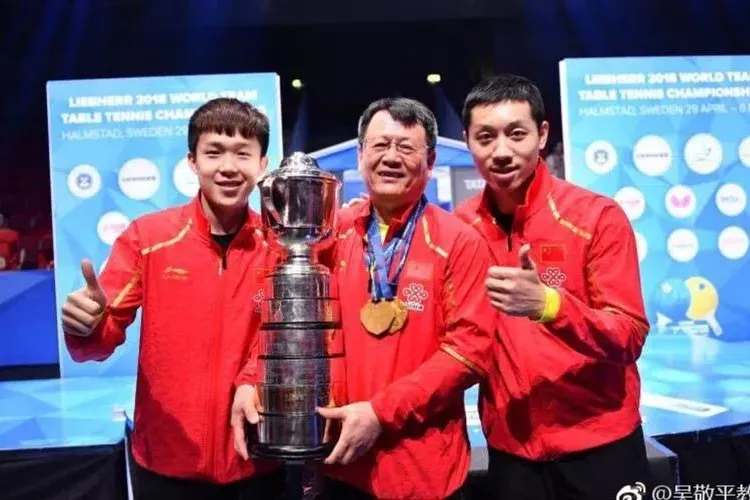
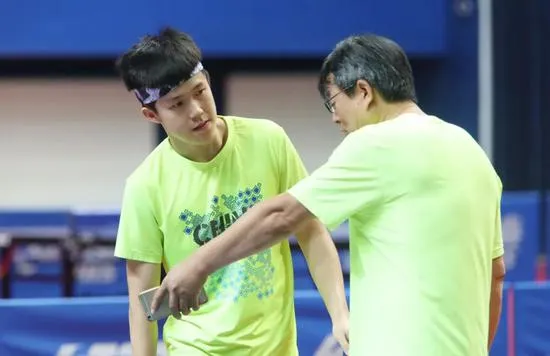
2019-2022: Coach Liu Guozheng,
The “Start-Up Father and Son” Duo
A few months later, Coach Liu Guozheng took over Wang’s training and match coaching. The two were playfully dubbed the “start-up father and son,” thanks to their fresh pairing and Liu’s hands-on coaching style.
Things started clicking fast. In April 2019, at just 18 years old, Wang Chuqin won his first major title in men’s doubles with Ma Long at the 2019 World Table Tennis Championships in Budapest. Six months later, he snagged his first singles title at the Swedish Open.
The train was moving. Wang was on his way. But then came the turning point.
In November 2019, after a frustrating loss to a teammate at the Austrian Open, Wang angrily slammed his racket onto the table. The outburst led to a three-month suspension. Worse still, Coach Liu Guozheng was suspended for a month, caught in the fallout of his player’s actions.1
Bouncing back was tough. Wang Chuqin pushed his way into the world’s top 20 while enduring a painful two-year singles title drought. The COVID-19 pandemic only made things worse. Tournaments got wiped off the map, rhythm went out the window, and everything stalled.
His comeback moment hit in early 2022, when he won a singles title at WTT Macao Stars of China.2 But just as things seemed to be looking up, Coach Liu left the CNT unexpectedly for personal career reasons.
Wang, now a top-15 player in the world, was left without a coach. Again.

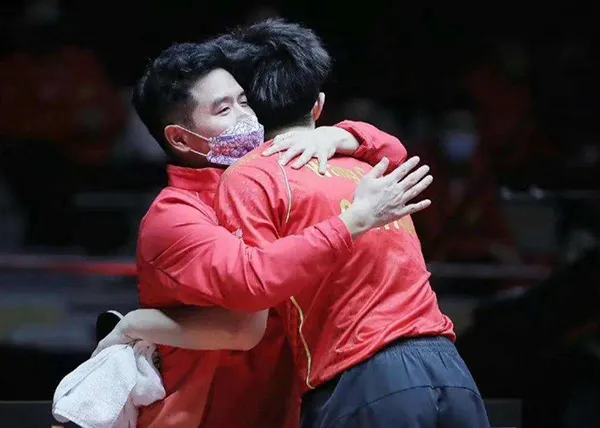
2022: The No-Coach Year, A One-Man Army
Throughout all of 2022, Wang Chuqin was on his own. No supervising coach. No structured training plan. Yet somehow, he still put together one of the most impressive runs of his career.
In October 2022, Wang helped CNT win gold at the World Team Championships in Chengdu. It was his first time sharing the stage with Ma Long and Fan Zhendong in such a major competition, a clear sign that he had cemented his place as the third core player in CNT. He followed up with back-to-back singles titles at WTT Champions Macao and the WTT Cup Finals in Xinxiang, skyrocketing to World No. 3.
Then came the Asian Cup in Bangkok in November. Wang was spotted alone at the airport, slurping instant noodles, while teammates were likely surrounded by their coaches. Before his quarterfinal, he needed a left-handed sparring partner to prepare. With no left-handed teammates available for him, Lin Lin Yun-Ju from TPE, a friend and fellow lefty, stepped in to help. Then Wang had to temporarily borrow a teammate’s coach during his match. Unsurprisingly, CNT exited early.
It was one of the most telling moments of the year. Frustrating to watch, and even more infuriating to realize it wasn’t an accident. This was CNT’s system at work.
2023-Present: Coach Xiao Zhan,
The Mixed Doubles Dilemma
By January 2023, Wang Chuqin had secured the World No. 3 ranking and was a core player in CNT. That’s when CNT launched their new project: a mixed doubles unit. Coach Xiao Zhan was put in charge, and Wang was placed under his supervision.
On paper, it looked like progress. But in reality? It was just another workaround.
Wang was never officially assigned a dedicated supervising coach like his peers. Calling Xiao his coach was more like a strategic compromise. Since Wang was the top male seed in mixed doubles, it made sense to group him with the new unit. But Xiao’s attention was split between him and the other mixed doubles players. It was far from the exclusive coaching setups Wang deserved and clearly revealed how systemic neglect undermined CNT’s own echelon-based development model.
2. Wang Chuqin and Coach Xiao Zhan
When it comes to Coach Xiao Zhan, my feelings are… complicated.
On the one hand, Wang Chuqin finally had a coach he could communicate with directly, and they seemed to get along well. On the other hand, Xiao’s well-known high-intensity training style might’ve leveled up Wang’s game, but it also came with physical strain, injuries, and what I can only imagine as soul-crushing mental stress.
The real issue, though, was that Wang and Xiao had completely different priorities. Despite Xiao’s reputation, he turned out to be an unreliable support system when Wang needed him most.

2.1 Xiao’s Background: From Grand Slam Glory to a Career Reboot
Xiao Zhan had a long path to this moment. He played for CNT in the 1980s and spent the 1990s coaching in Qatar and Taiwan before returning to China in the early 2000s. His claim to fame was coaching Zhang Jike to the fastest Grand Slam in history, collecting all singles titles at the Olympics, World Championships, and World Cup in just 445 days between 2011 and 2012.3
But after Zhang retired due to injuries (which, spoiler alert, were probably related to Xiao’s brutal training style), Xiao struggled to find his place in CNT. So when the opportunity arose to lead a new mixed doubles unit, he jumped at it. It was a fresh career move, not just for him, but also for CNT. A new coaching setup with promising but untested results.
Wang Chuqin, meanwhile, was exactly the kind of player Xiao needed. Fast, aggressive, rising fast, and most importantly: unclaimed. No supervising coach, no deep-rooted place in the coaching hierarchy. Oh, and conveniently, Wang and Sun Yingsha were already an unstoppable mixed doubles duo. Even without the Wang-Sun pairing, Wang had maintained an incredible win rate in mixed doubles with other female partners. It was a clear win for Xiao’s new unit.
CNT had its eyes on redemption in mixed doubles. Xiao locked onto Wang as the centerpiece. Wang, in return, finally had someone in his corner. For once, he wasn’t totally alone. Having a coach with real experience, having someone he could call “my own people, my own mentor,” was something he had long desired. 😢
At the very least, Xiao seemed like he could offer a new chapter in Wang’s career. If only Wang had known that the “new chapter” would turn into another dead-end, a painful experience…
2.2 Mixed Doubles First, Everything Else Later ♾️
Coach Xiao’s official job title, “head of the mixed doubles unit,” sounds impressive, maybe even on par with the men’s and women’s team head coaches. However, in reality, the unit operates outside the traditional CNT structure, relying on players from both the men’s and women’s teams whenever schedules allow, making it a floating squad at best.
For Xiao, mixed doubles was absolutely the number one priority. In multiple interviews, it was revealed that Wang Chuqin had to spend up to 90% of his training time on mixed doubles. Even his early morning training sessions were dedicated entirely to mixed doubles, including footwork adjustments, attacking angles, rhythm shifts, and swing speed. Everything revolved around mixed doubles rather than balancing training across all three events.
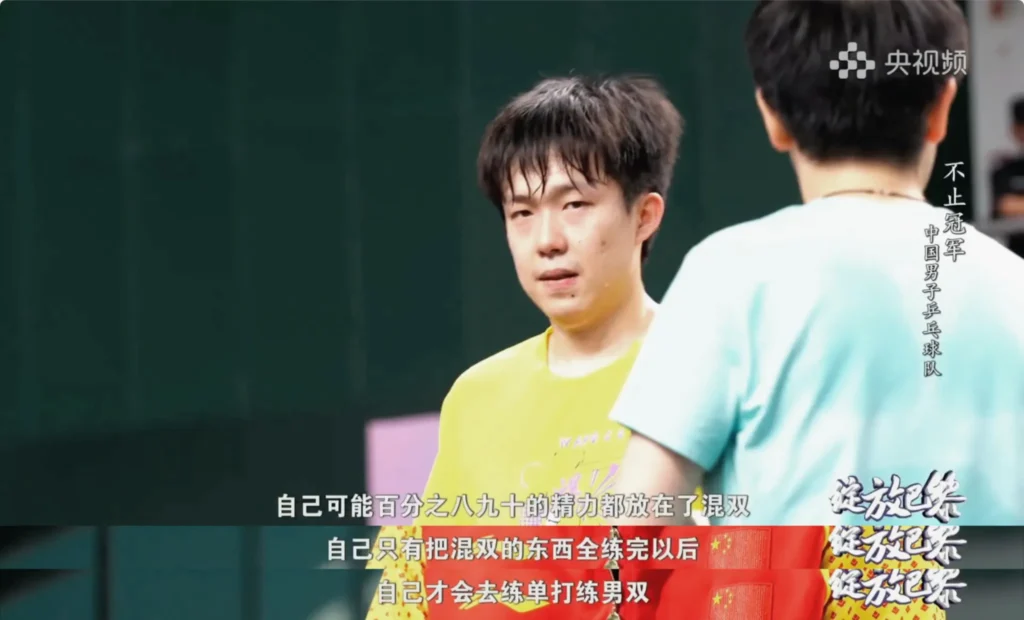
In the documentary “Blossom in Paris,” Wang Chuqin mentioned: “I’m putting 80% to 90% of my energy into mixed doubles. Only after I finish all the mixed doubles training will I turn to singles and men’s doubles.”
I can’t say for sure how this affected his singles career, but let’s be realistic: Mixed doubles isn’t the main focus for other top CNT male players. And if almost all your training and preparation are focused on doubles strategy, how much time is left for the singles performance?
There were whispers that Xiao Zhan bet his entire career on winning mixed doubles gold at the Paris Olympics. And he didn’t even try to hide it. In an interview, he bluntly admitted, “Since I’m in charge of Wang Chuqin’s training, I can help with his singles and men’s doubles prep, but if he doesn’t deliver in mixed doubles, I’ll drop him. Winning Olympic gold in mixed doubles is my one and only mission.”
Excuse me? That sounds more like an ultimatum than coaching.
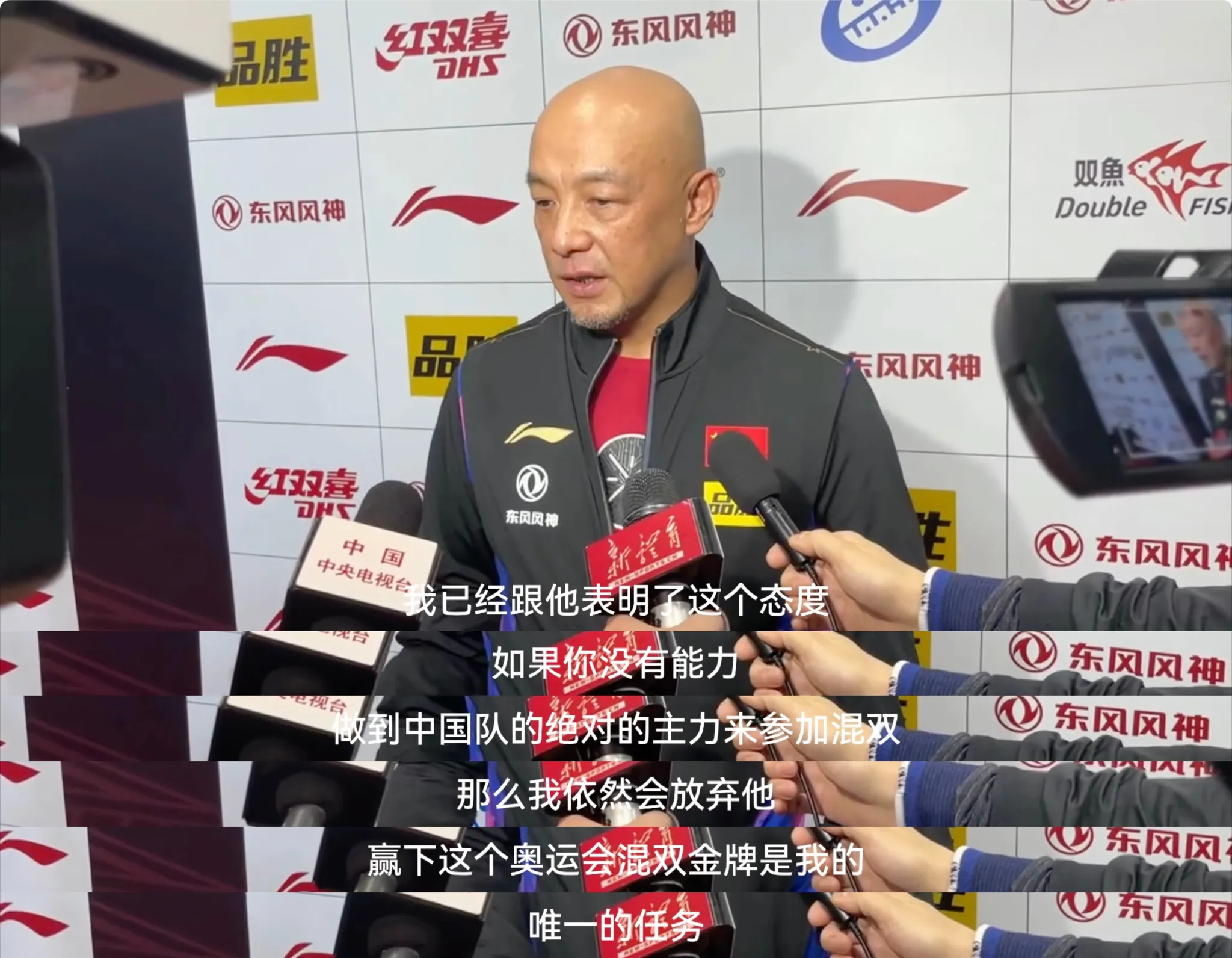

As a top triple-event player, Wang was stuck in mixed doubles and effectively sidelined in training priority. But was it just Coach Xiao’s decision, or was the entire CNT administration behind this weird priority shift? A quiet, top-down decision to put mixed doubles above everything, even if it came at the cost of Wang’s health, performance, and future?
2.3 A Coach Who Can’t Get Things Done❗️
Coach Xiao Zhan had a legacy. He had a history. But in his current role, he had no real pull. Nowhere near the authority of heavyweights like Wang Hao and Ma Lin, the heads of the men’s and women’s teams. Even Xiao admitted it was hard to get Wang Chuqin and Sun Yingsha released from their respective teams for mixed doubles training, and sometimes needed CTTA president Liu Guoliang’s intervention.
2.3.1 The Tournament Scheduling Disaster
Xiao’s real incompetence, though, showed in communicating and advocating for Wang when it mattered most, especially with tournament scheduling. For years, Wang has been forced to play back-to-back matches like a marathon runner, while Coach Xiao did nothing about it.
Here’s how it usually went in major tournaments,
- As the tournament advanced, XD (mixed doubles) matches were typically scheduled earlier in the day, followed by MD (men’s doubles) and singles in later sessions. This meant Wang had to peak for XD first, aligning with Coach Xiao and CNT’s priority.
- By the time Wang reached the later rounds of singles, he was already physically and mentally drained. While his opponents, who weren’t juggling three events, were fresher and ready.
- Meanwhile, Wang’s opponents, teammates, and even his doubles partners had more time to rest and reset. And guess what? They all had dedicated supervising coaches around.
At WTT Star Contender Doha 2024, Wang Chuqin endured an intense five-match schedule in just 11 hours and won them all 3-0, ultimately earning the singles and mixed doubles titles. Insane. He was spotted barely able to stand after the match.

Seven months earlier, at the 2023 World Table Tennis Championships in Durban, Wang Chuqin was on court for a record-breaking 10 hours and 16 minutes, playing 72 games. He won both mixed and men’s doubles titles, but lost in the singles final to teammate Fan Zhendong 2-4. Afterward, Wang admitted he could barely stare at the ball by the end.
Throughout the eight days of this WTTC, Wang was constantly running from one match to another, playing three matches a day for three days. After winning the XD final, he had less than two hours before his singles quarterfinal. Cameras caught him face-down on a table in the training hall, trying to sneak in a nap with his freshly won gold medal beside him. 😞
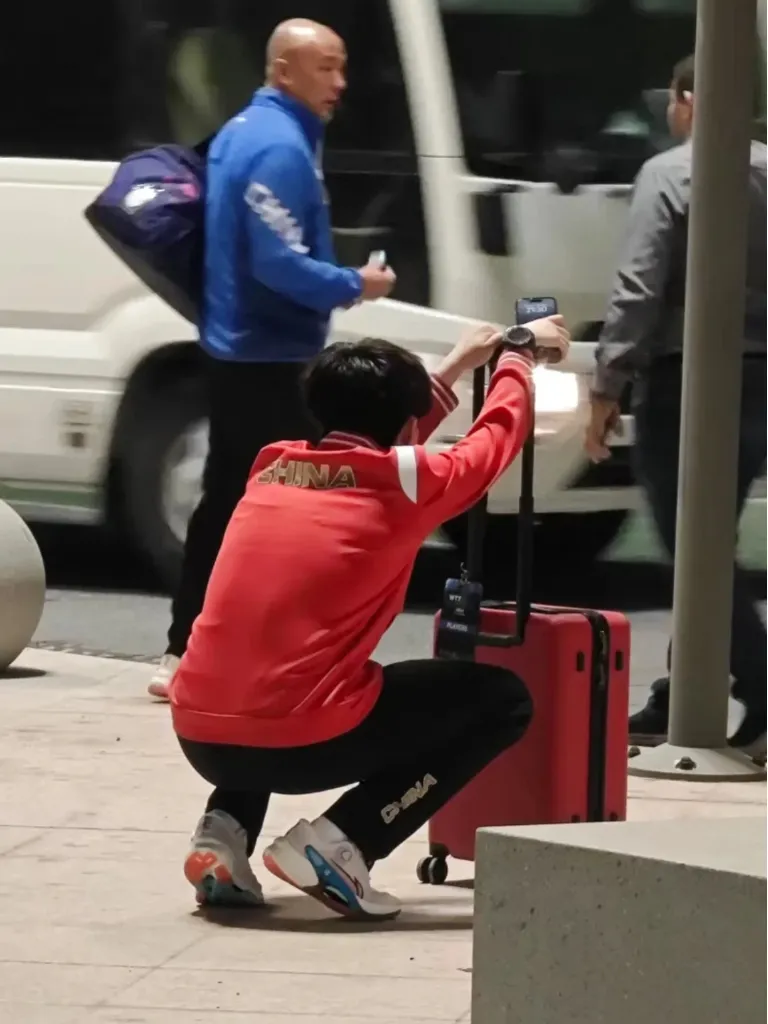
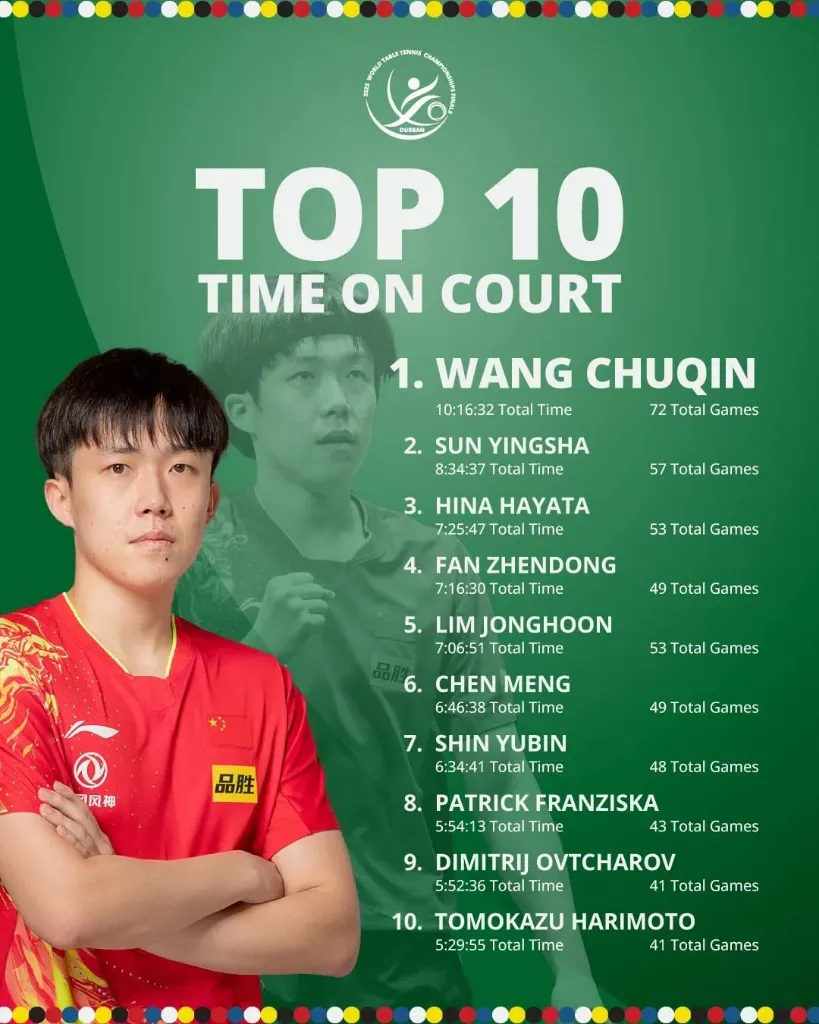
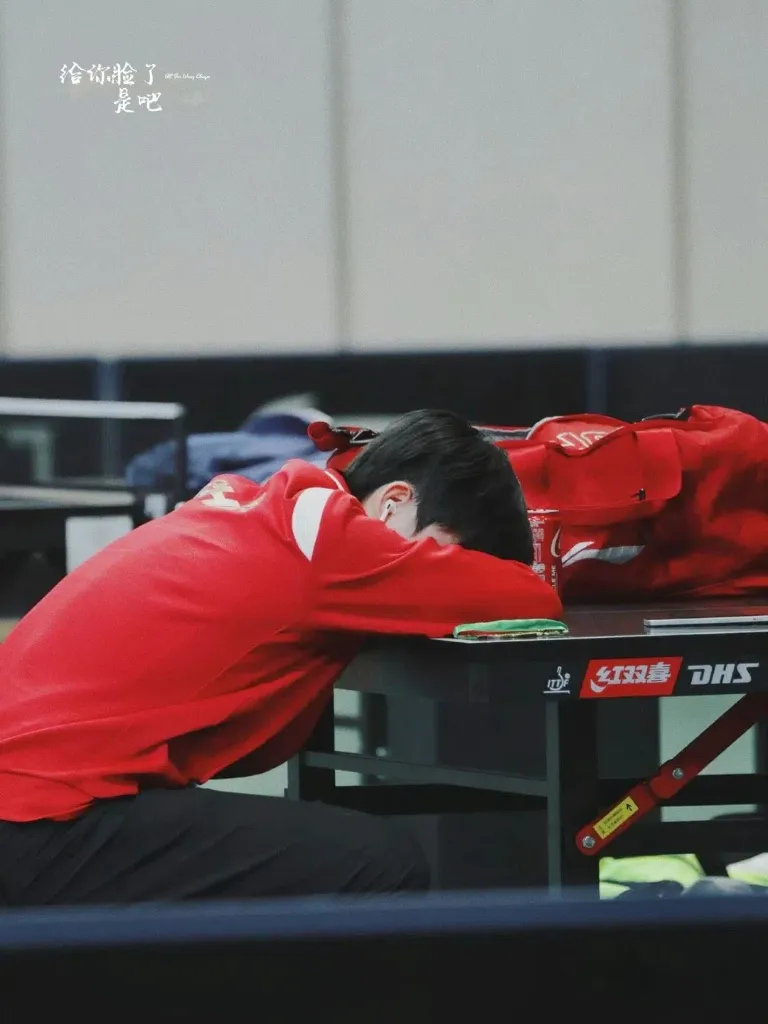
And what did Coach Xiao do about it? Nothing.
When many questioned whether Coach Xiao would challenge these unreasonable schedules, he reportedly said he couldn’t do anything.
But somehow, CNT allegedly negotiated to reschedule the men’s doubles R32 match for the Wang Chuqin/Fan Zhendong pair because it was too close to Fan’s singles match. That round got bumped to the night session, but just 1hr 20mins after Wang’s mixed doubles match.
Moreover, night matches were routinely delayed, and that day was no exception. Wang finished XD around 9:10 pm, then rushed to the next table for MD at 9:30 pm. Barely enough time to wipe his face, let alone recover.
Of course, remember CNT’s resource allocation favoritism? As CNT’s strongest right-handed player and singles gold medal favorite, Fan got the breathing room and the more reasonable schedule he needed. And Wang, the workhorse who played the most matches and carried the most weight, was treated like a fire extinguisher, only grabbed when things went up in flames.

2.3.2 Bang! Olympic Horror Story 💣
Then came the Paris Olympics. Everything that could go wrong, did.
As the one and only triple-event player, Wang Chuqin had been battling a persistent shoulder injury for months that had severely affected his forehand. Rumor had it that CNT requested to push Wang’s singles R16 match after the XD final. It was likely to ensure that China secured the XD gold first, in case Wang’s physical condition worsened.
We all know what happened next.
Right after the emotional high of winning Olympic XD gold, Wang found that his racket had broken in the coaching area. And less than 10 hours, including sleep, he had to play his R16 match in a “physical and mental state that seemed to be at a breaking point.” He crashed out early.
Afterward, he admitted things might’ve turned out differently if his R16 match had been pushed back that day. Yet Coach Xiao and CNT didn’t even try to renegotiate the schedule, not even after one of the most infamous incidents in Olympic table tennis history.
I still remember that heartbreaking moment. 💔 Wang was visibly overwhelmed when he saw his broken racket. In frustration, he asked Coach Xiao, “Report them! Why can’t we report?”
Xiao’s response? “It’s useless.”
Not “I’ll talk to the officials.” Not “Let’s figure this out.” Just a flat-out dismissal.
At a time when Wang needed someone to fight for him, to stand up for fairness, to at least try, he got nothing.
It’s one thing to avoid conflict. It’s another thing to not even try to push back against the system. And when a coach chooses silence over standing up for his player, that’s not just incompetence.
It’s negligence.
2.4 Negligence, Injury & The Cost of Brutality 💊
Another piece of the puzzle fell into place not long ago.
In the months leading up to the Olympics, Wang Chuqin quietly struggled with a mysterious shoulder injury. He tried physical therapy, strength training, acupuncture, cortisone shots, and countless painkillers, but nothing worked. Instead of pushing for proper medical intervention, Coach Xiao Zhan brushed it off as “normal” and told Wang to just push through.
Sound familiar?
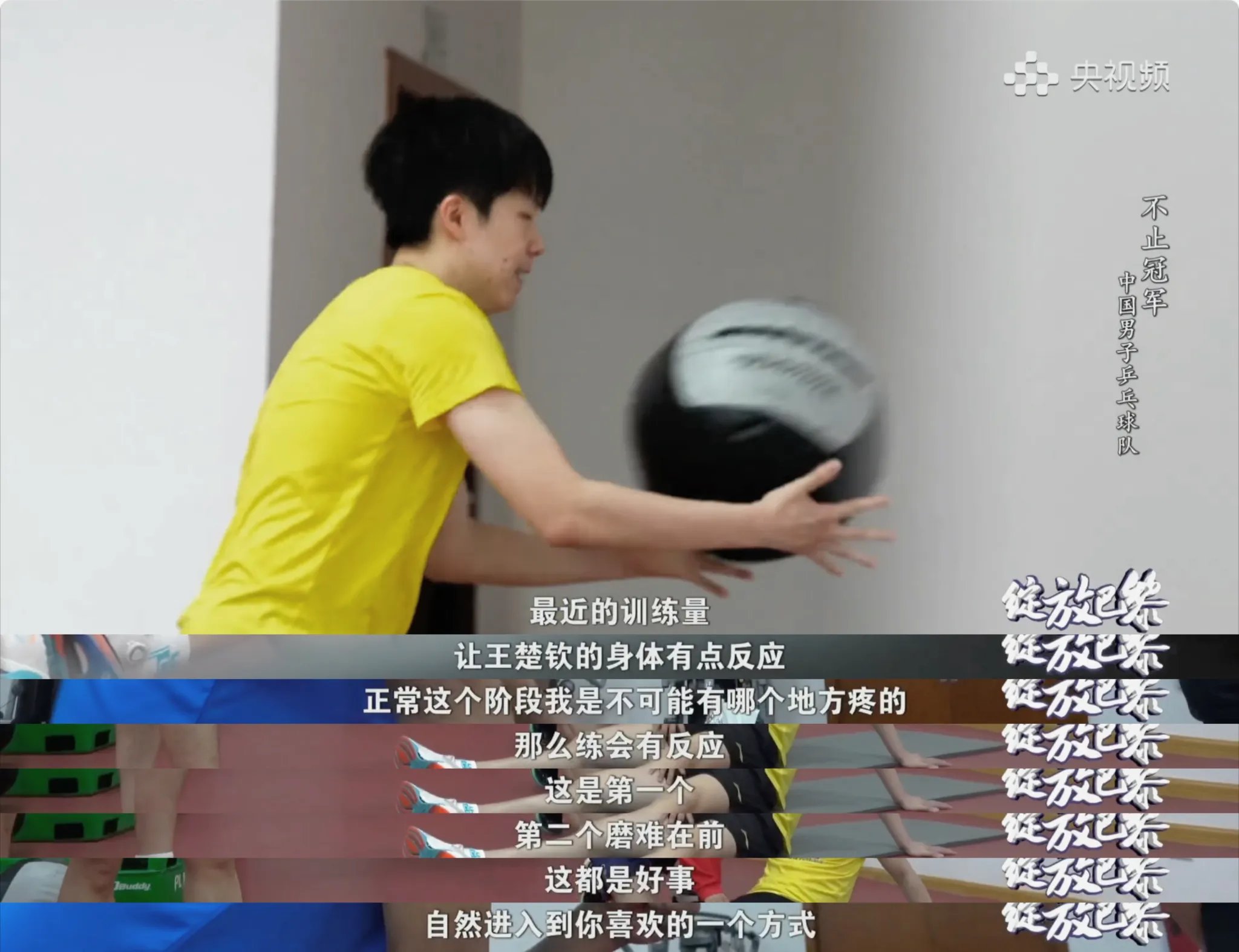
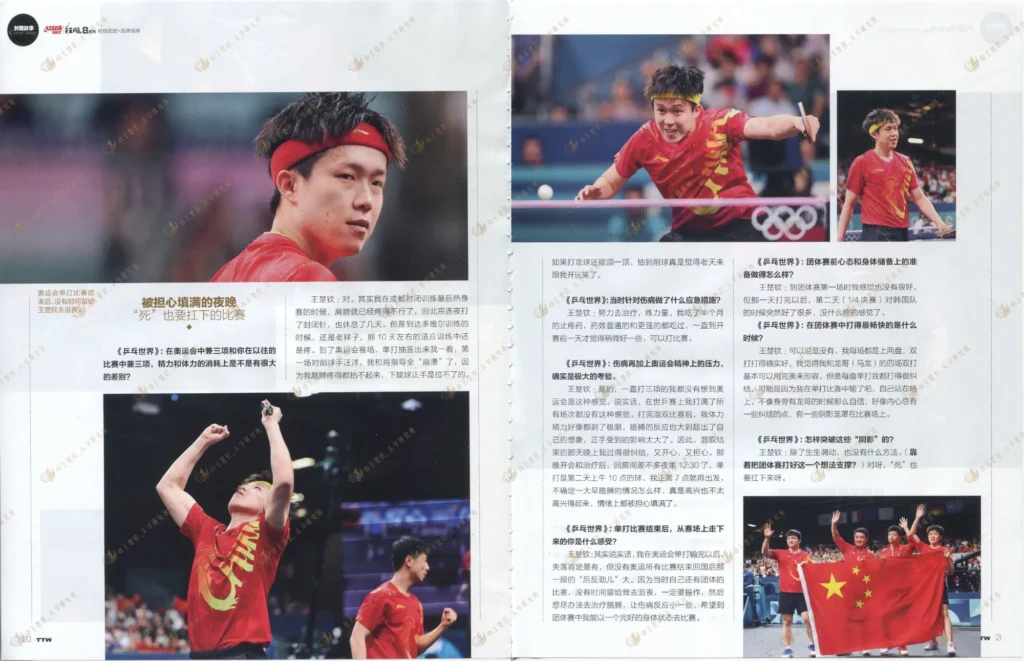
Coach Xiao’s training philosophy is known for its intensity, characterized by relentless drills, an overwhelming workload, and extreme discipline. Although it may have helped players achieve short-term gains, it also led to severe injuries. Zhang Jike is a prime example. One of the most successful table tennis players, but retired early due to chronic back and hip injuries.4 Wang Manyu also suffered severe knee pain under Xiao’s watch around 2022.
And with Wang Chuqin, nothing changed.
Wang has long been known as the hardest-working player in CNT. For two years before the Olympics, he lived on a 6 am to 10 pm training routine. First to arrive, last to leave. And under Xiao’s guidance, the workload only intensified. (Some training clips honestly looked excessive. Is this really necessary?)
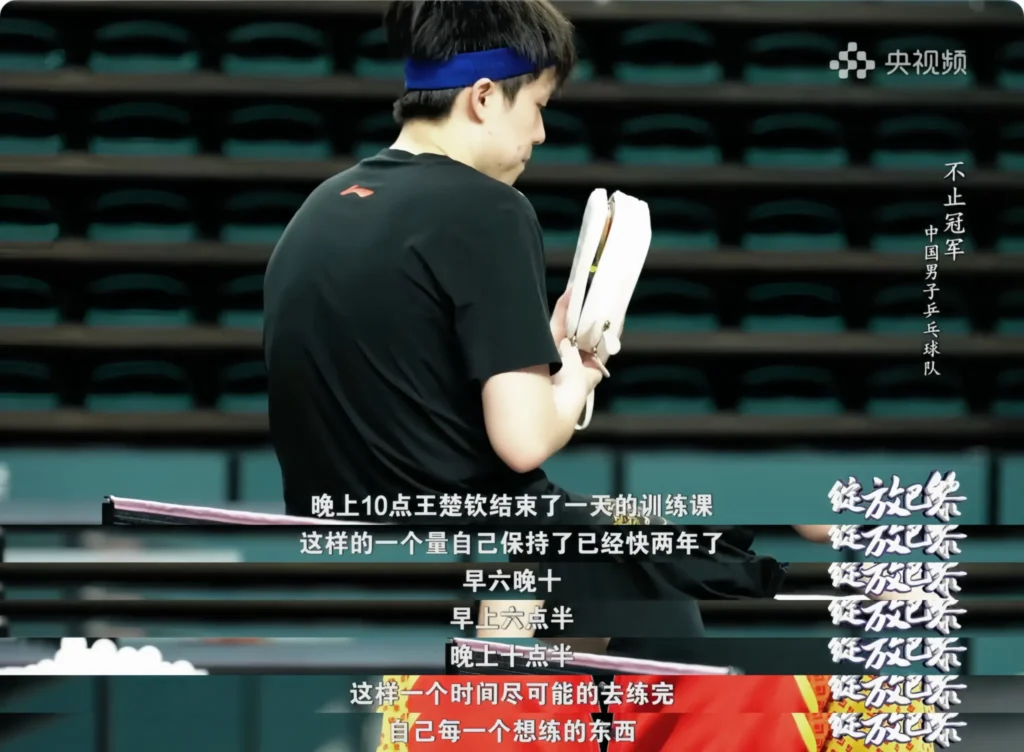
While Wang kept pushing through the pain, his shoulder injury lingered for months, reaching its worst point at the Olympics. Even after winning XD gold and suffering an unexpected singles exit, Xiao never escalated the issue. It wasn’t until a senior doctor happened to step in that Wang finally got a proper diagnosis.
Ironically, it was the exact same injury Zhang Jike suffered at the London Olympics in 2012, under Coach Xiao’s watch.
You’d think a coach or the CNT would have learned.
Neither negligence nor “doesn’t care” indifference thoroughly explains it. It was a pattern. A brutal one. And I still can’t wrap my head around it. Awful.
This Disregard didn’t just hurt Wang or damage his first Olympics; it exposed a critical contradiction within CNT’s approach: prioritizing short-term gains and immediate results over player health and long-term sustainable dominance.
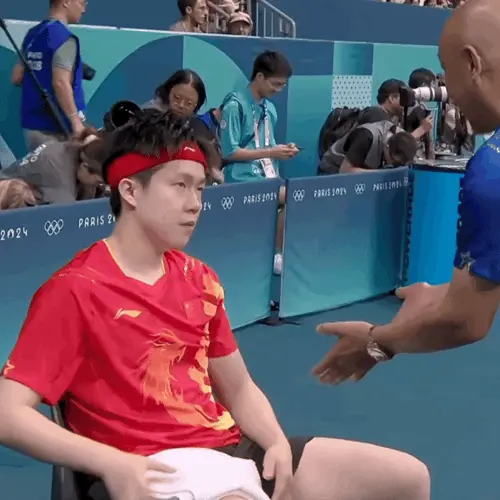
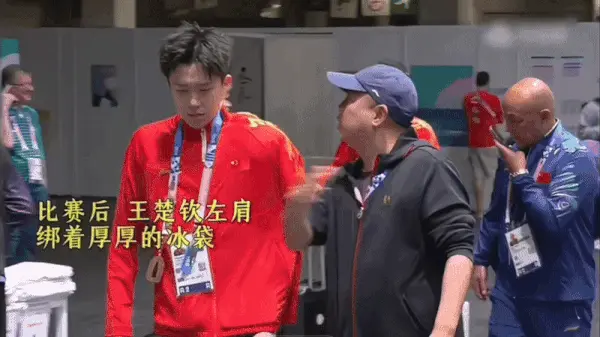


Thankfully, in a recent interview at the 2025 Asian Cup in Shenzhen, where Wang Chuqin stood holding the champion trophy, he revealed that after discussions with Coach Wang Hao and Xiao Zhan, he’s no longer training with the same extreme intensity as before or draining himself completely in daily practice.
After years of burning himself out, he’s finally taking some control.
2.5 Attitude Problem: A Coach Who Checked Out
Coach Xiao’s lack of involvement extends beyond scheduling and injury management. It extends to match-day coaching.
An on-court coach isn’t just there to bark orders. They’re a tactical support, an emotional anchor, and a mental reset button. Usually, the heads of men’s and women’s teams take charge of singles and doubles. However, players can choose their supervising coach for singles matches. Top players like Liang Jingkun and Sun Yingsha always have their supervising coaches by their sides.
When Xiao became Wang’s coach, Wang chose him to sit courtside for major singles matches, including the 2023 WTTC. He said, “Coach Xiao always cheers for me with passion, always gives me confidence, and we both value the communication we build up day by day. As we look toward long-term collaboration, we need to understand each other better through matches.” Wang also added, “I’m grateful to the team for giving the athletes such autonomy and respecting our opinions.”5
From what I’ve seen, Coach Xiao is present at the tournaments where Wang Chuqin competes in both singles and mixed doubles, but at singles-only events, his presence has been inconsistent.
The last time Xiao was spotted courtside for Wang’s singles match? His R16 loss in Paris.
After achieving mixed doubles gold in Paris, Wang fell into a slump, struggling through yet another stretch of back-to-back competitions without Xiao’s support. Instead, Xiao was sometimes seen on personal leave or in the training hall with Wang, but for the most part, he focused on coaching other XD players.
Updated Feb 27: A rumor said Xiao’s absence was due to a severe shoulder injury that required surgery. Well, a brutal training style that even injured the coach himself? Hopefully, this 57-year-old coach is recovering well.
That said, over the past half-year, the Wang-Xiao partnership has felt distant. And once again, Wang is left without a real supervising coach.
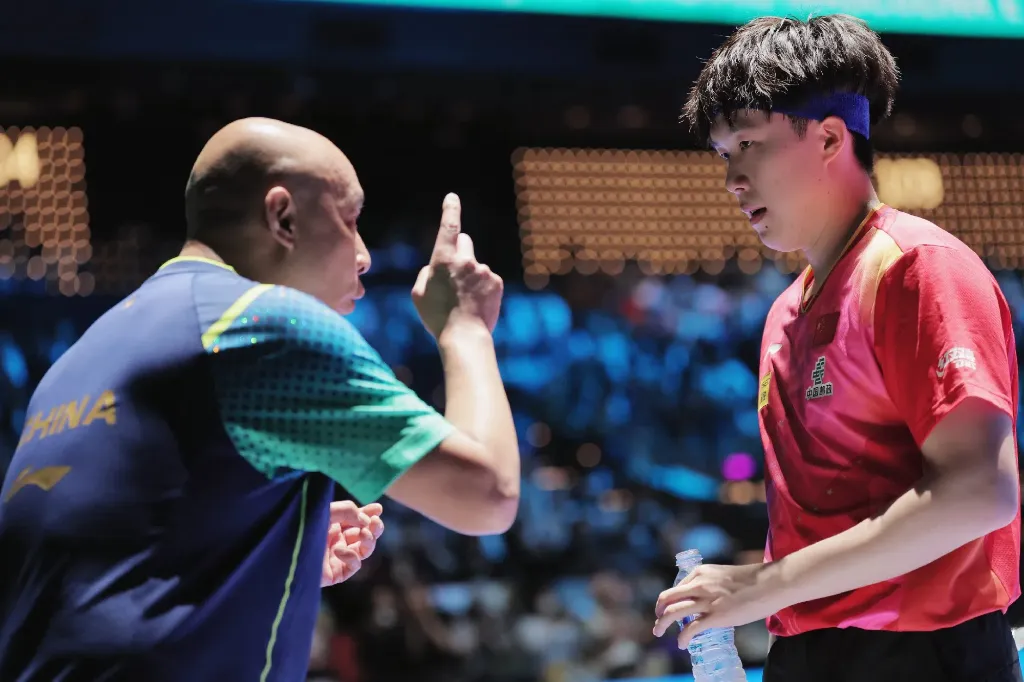
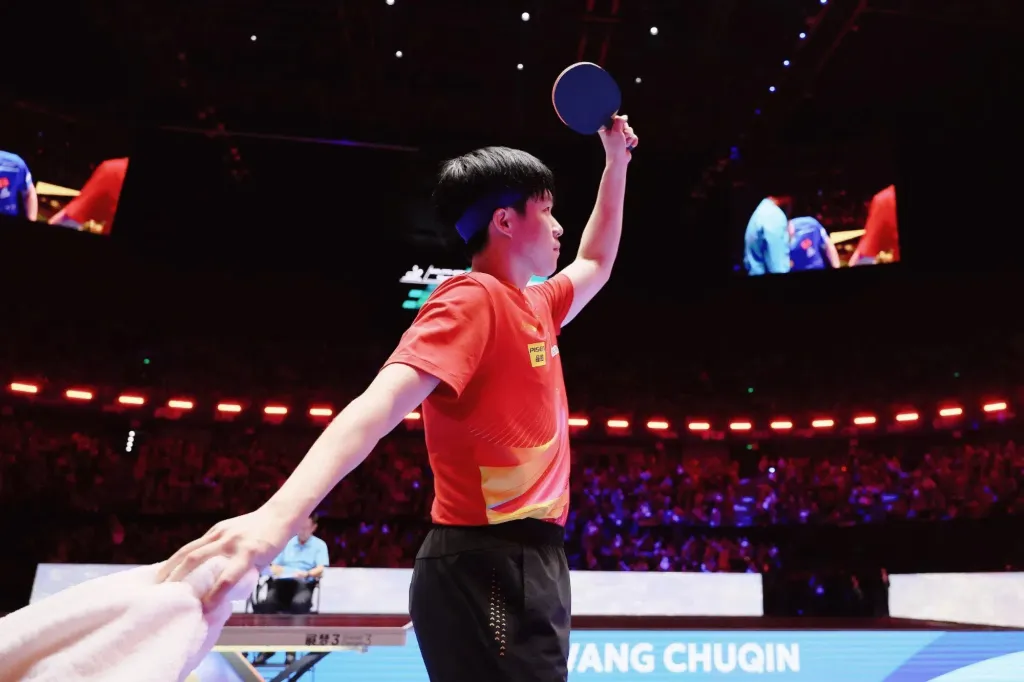
3. Final Thoughts: Wang Deserved Better
Writing this far has left me exhausted. Emotionally drained.
Watching Wang Chuqin’s matches started as pure joy. We discovered him and celebrated his rise. But then came the shock, the confusion, the frustration, and eventually, deep disappointment with the system surrounding him.
Drifting without a harbor, growing without a guide. That was Wang Chuqin’s early years in CNT. As we’ve discussed, he was mostly left to navigate the larger men’s team, rather than enjoying steady coaching and tailored resources. He wasn’t given a clear path, so he carved one himself.
He learned from everyone and everything around him, seeking advice from any available coaches in the training hall, soaking up insights from teammates, grabbing sparring partners among friends, and even picking up English from staff members.
He is like a sponge, absorbing knowledge wherever he can. He is like water, “takes the shape of anything it enters.”6
Yes, water.
Lately, some have described his playing style as fluid, adaptable, and ever-changing. But being water isn’t just about the cliché “formless” sense. It’s about movement, transformation, and finding a way through any obstacle. Wang didn’t just develop a flexible playing style; he shaped himself through flexibility, and shaped himself in ways the system never accounted for. Being water wasn’t even a choice. It was a matter of survival, the only way forward.
Even now, even after proving himself time and time again, the system still treats him like an afterthought. Just last week at the Asian Cup, Wang won his second continental title (his first was at the 2023 Asian Games, where he became the first player in history to sweep all four events). Yet before the tournament began, he was seen practicing alone with a young training partner, while his teammates were surrounded by head coach Wang Hao, their supervising coaches, and strength trainers, an entire support team.
Wang has shown the world he can succeed without CNT’s full backing, but why should he have to? The best player in the world shouldn’t have to fight for the basic support he deserves.
He deserves a real supervising coach. Someone who prioritizes his entire career, not just men’s doubles or mixed doubles, not just short-term medals. Someone who will travel with him, strategize with him, and provide the level of resources other CNT players take for granted.
He’s fought his way to the top. Now it’s CNT’s turn to step up and support him properly.
And I’ll be watching to see what happens next.
Read Also
Wang Chuqin vs. Systemic Bias Against Left-Handers in Chinese Table Tennis
Wang Chuqin Part | Documentary “Blossom in Paris” | Eng Sub – YouTube
Wang Chuqin’s Olympic Injury Story that We All Missed
“Giving my all to be my best self.” Interview by Table Tennis World
2025 WTTC Doha: Calm After the Climb 👑
Wang Chuqin’s Recent Slump: He’s More Than Just a Non-Stop Ping-pong Machine
References
- China suspends Wang Chuqin – International Table Tennis Federation ↩︎
- Wang Chuqin and Wang Manyu Prevail At WTT Macao ↩︎
- ZHANG Jike – Olympics ↩︎
- Zhang Jike changing his heart on retirement – International Table Tennis Federation ↩︎
- 王楚钦:希望成长的脚步更快些 ↩︎
- Bruce Lee Quotes (Author of Tao of Jeet Kune Do) ↩︎
Published on
Updated on
March 16, 2024
Leave a Reply